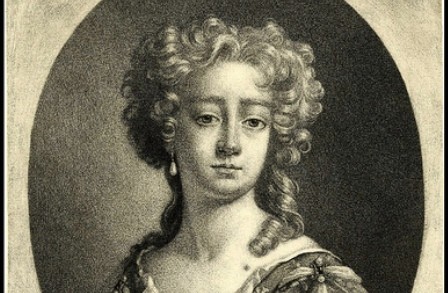The original idea when I read this poem nearly concurrently several months ago with the two recent works I just wrote about was that this would be a companion piece to the other one. I don't remember the intention now, but it was not to try to purposefully beat down the newer books by contrasting them with an old classical English poem. Believe it or not over the years I have come to feel bad, even guilty that I usually only like older things. I don't know why I should respond to them, since I have no more really to do with them than I do with all the wonders and glories of modern life that I don't relate to, for which reason I actually have a certain respect for them. The advantage an author like Dryden has with me is that I associate him with nostalgia for the time when all this literature was exciting and seemed to offer hope and promise everything else. Anyway, at the time I wanted to write something about this poem, but I don't remember what it was now.
The beautiful Anne Killigrew
The occasion of this ode of course is the death of a young lady otherwise of little interest to history. My only marginal comment on it is "amusing and fun". Yes, well it is those things. Are you telling me that such sequences as
"Whatever happy region is thy place,
Cease thy celestial song a little space;
Though wilt have time enough for hymns divine,
Since heaven's eternal year is thine."
when you consider that he is addressing a dead person, are not funny? Maybe they aren't. I laugh at inappropriate and poorly understood things a lot . How about this comment on one of Miss Killigrew's paintings, crowded with satyrs, flocks of sheep, Roman ruins and other trappings of the Classical world:
"So strange a concourse ne'ver was seen before
But when the peopled ark the whole creation bore."
How about this one, on a portrait the dead lady had executed on King James II:
"The scene then changed: with bold erected look
Our martial king the sight with reverence strook;
For, not content to express his outward part,
Her hand called out the image of his heart:"
I have written about Dryden and the decline of his reputation and influence over the centuries before, one of the reasons for this being the frequently absurd and consequently hilarious effect he has when writing about somber topics. His writing abounded in exuberance and bombast, which I have a taste for when done in a somewhat clever style. And perhaps there is some value in being familiar with this type of literature in one's youth, it does enhance the perception and color one's experiences in a generally positive way for a time. But there seems to be a limit to the period when it has this value if one is not moving in some positive direction oneself. If you are moving as your force these works can move with you in a kind of parallel or complement, but when you are not then the books will take on that air of stagnation and deadness, for you at least and for the people you would extol them to.
"Now all those charms, that blooming grace,
The well-proportioned shape, and beauteous face,
Shall never more be seen by mortal eyes:
In earth the much-lamented virgin lies!"
Subscribe to:
Post Comments (Atom)





No comments:
Post a Comment